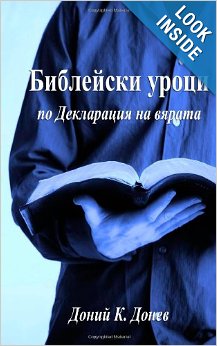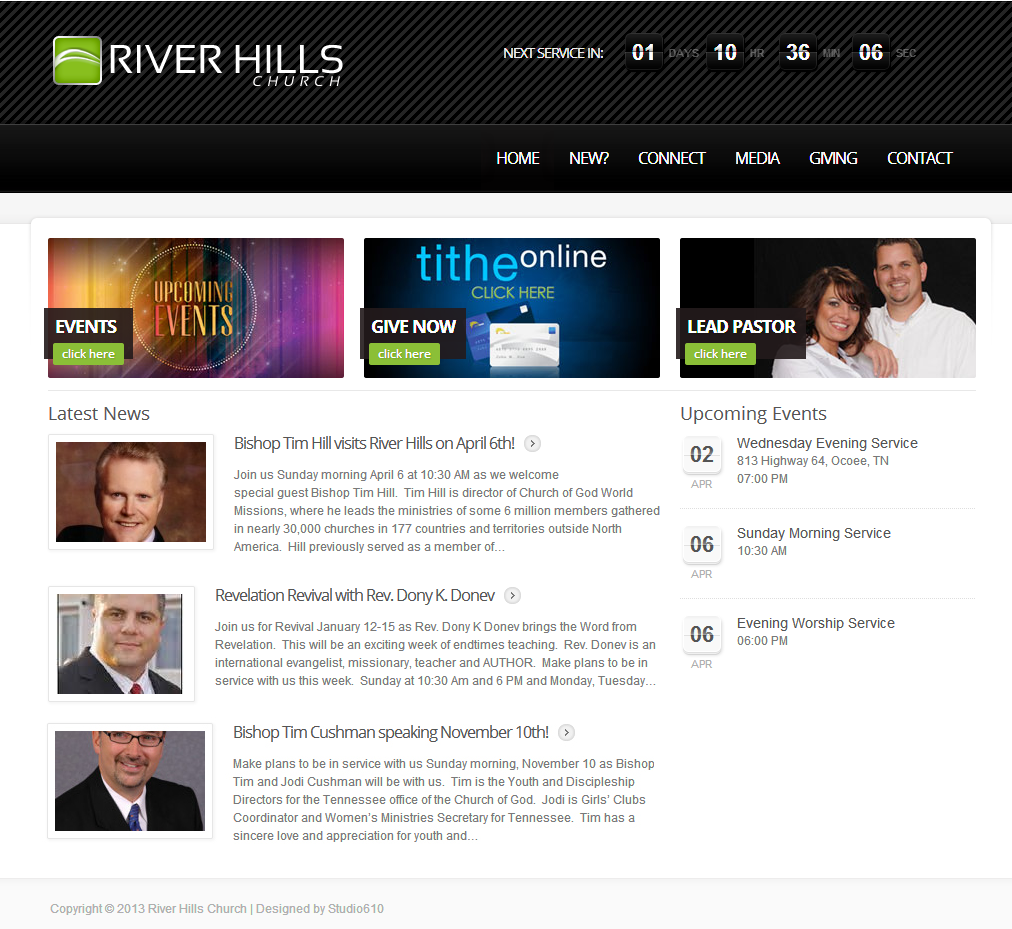Rapture of the Church
Internationalization vs. Naturalization of the Church of God
 In the beginning of 21st century, when perspective and persona are changed by postmodern thinking, church planting is most important. Providing a strategy for church planting and growth is to serve as a roadmap to success for Bulgarian church leaders and people who have dedicated their lives to making a difference within the community of believers. It is our prayer that such strategy becomes part of the Great Commission given to the Christendom.
In the beginning of 21st century, when perspective and persona are changed by postmodern thinking, church planting is most important. Providing a strategy for church planting and growth is to serve as a roadmap to success for Bulgarian church leaders and people who have dedicated their lives to making a difference within the community of believers. It is our prayer that such strategy becomes part of the Great Commission given to the Christendom.
The process of transformation of Bulgarian communities in the United States toward a more contemporary and functional model of ministry will inevitably reflect on the process of internalization, which is taking place within the Church of God. The natural birth of the church, however, as described by the Bible does not include a process of internationalization in which one nation creates an environment for other nations in order for better representation. On the contrary, the Bible speaks of ecclesial equality represented by many ethnic groups naturalized in the body of the church. Naturalization in the church brings both equality and unity among its members. Internalization, respectively, resembles a process of mechanical assembling of a large mass of people under one name without giving them a unique nature that characterizes the community.
Further recognition of the ethnic groups of non-American-born believers represented within the Church of God in the United States will provide the ability to naturalize its infrastructure as a body, rather than artificial over force to internationalize a body of an already ethnically diverse community. In the beginning of the 21st century such strategy will give the Church of God the opportunity to successfully target cross-cultural communities across the United States and produce church growth in metropolis and large urban developments, where the strategies for growth based on its historical dominating rural culture have proven long-ineffective. Finally, such detailed focus on cross-cultural ministries will assure the productive attention not only to large ethnic groups, but also to small and growing cross-cultural communities, which will continually assure the cultural and ethnic diversity of the Church of God and will provide it with a realistic international appearance.
Excerpt from Analytical Overview and Church Planting Proposal for Bulgarian American Congregations Considering Cultural, Economical And Leadership
Dimensions
Repost: The Exodus of the Youth from Church: In Search of Answers to a Dark Dilemma
I recently sat in a lecture “Why Are Youth Leaving the Church?” I listened to the most recent statistics, compared one opinion to the next, looked at the latest church involvement research and even explored some emerging themes of why people in general leave the faith. All the information was very interesting and contained an impressive collaboration of ideas. The research does not lie and opinions are to be valued. However, honestly what good does this enlightenment do us when we sit back and do nothing to correct the problem? We are so used to youth leaving our church that we have become complacent with pews filled with “ancient dinosaurs” in the words of a young lady just last week. We have become so overwhelmed with data that we forget to look at the real picture of why our next generation of leaders are leaving. Or perhaps we do nothing because we simply don’t understand young people’s true motivation for leaving the church. The answers may be uncomfortable for some but they deserve deeper exploration.
Youth are leaving the church but this does not necessarily mean they all are leaving the faith. Many young people of today have much more faith than some of the pew fillers whom have their assigned seats with their pillows and blankets left to save their spots. So if this is the case that they still have a genuine relationship with Christ but simply don’t want to be within the four walls of religion, so to speak, should we not explore the million dollar question differently? We should not excuse away their leaving to agnosticism, postmodernism or neopaganism regardless of how cleverly it takes the focus off of the real concerns and sins of the “church.” It is not a very popular idea to confess the sins of the church which is ironic when we proclaim to be a house of confession. Perhaps confession is only good for the soul as long as the sins are not our own. Behind the irony rests a darker problem, one that is responsible for many young people leaving the church.
For years the church has been a place of hypocrisy and today’s young generation is one that is fed up with the dishonesty and is willing to take a stand. They are so disgusted they can no longer keep silent. They are not willing to “tweak the numbers” of the church financial records or work their way up the hierarchical ladder. They see through the masks and are not willing to compromise. Young people are tired of religious politics, bickering, back stabbing and lying. If we, the church, do not open our eyes to this now, if not yesterday, it will be too late.
This young generation is wandering looking for a place of refuge and they no longer find a safe place in the church house. The church regrettably is no longer safe. You cannot genuinely express your feelings, concerns or doubts without them being the topic of the message on the following Sunday morning. There is no longer trust within the church. The place of worship has turned into a place of gossip. A spiritual encounter has been replaced with a social gathering. The leadership of the Holy Spirit is no longer considered because we are too busy worrying about the opinions of others. So if by now you are still puzzled as to why the today’s youth are leaving the church then my heart is deeply saddened.
Nevertheless, we need to make a self-less effort and remember that the church does not exist for our personal entertainment. Realize it is not a prize to possess but is a treasure to be given away to the next generation. We must do whatever it takes to restore the tabernacle to its original purpose; to call its people back to holiness. We must be willing to give up our seat to the next generation before it is too late and there is no body left willing to fill the void.
Postscript: This article was written based on the following word the Lord gave me June, 2011: “The Church is not a prize to possess, but is a treasure to give away”.
Revival at Kinser Church of God
![Kinser-Church-of-God-REVIVAL[1]](https://cupandcross.com/wp-content/uploads/2014/05/Kinser-Church-of-God-REVIVAL1.png)
EFFECTIVE VIDEO FOR YOUR CHURCH EASTER SERVICE
When putting together a video that powerfully moves people the most important element to that video is a great audio track. The following project demonstrates this principal with a simple looping background product available here combined with the “Sirius” track by Allan Parsons Project (avaialable from itunes) and a message on the Victory of the Cross of Christ by David Wilkerson. The result was this:
SO HOW WAS IT PUT TOGETHER?
The Video was made all in adobe Premier. So if you don’t have after effects, you can still put together something like this using just video editing software such as Vegas, Final Cut, Premiere or even Imovie or Windows Movie Maker. [more]
Revelation Revival at River Hills Church
Sunday School program from the Declaration of Faith for the Bulgarian Church of God
 Sunday School program from the Declaration of Faith for the Bulgarian Church of God
Sunday School program from the Declaration of Faith for the Bulgarian Church of God
The Sunday School program for the Bulgarian Church of God was envisioned at the end of 2000. Because of the lack of continuity with Sunday School programs taught in the time before the communist Regime and general unavailability for translated curriculum, we created the program from scratch as follows:
2001 Taught first series at the Capital Church of God in Sofia
2002 Presented the newly published Sunday School to the General Presbyters Council of the Bulgarian Church of God
2003 Taught complete Sunday School series at Church of God in Pravetz Bulgaria
2005-2007 Over 40,000 copies of the Sunday School program were printed and distributed among the Church of God congregations
2010 Taught the Sunday School series in the Church of God in Ruse, Bulgaria
2011 Taught all 14 modules of the Sunday School series in the Church of God in Gabrovo, Bulgaria
2013 Taught the modules of the program via the Mobile Bible School
Rapture of the Church
We live in a post-Christian America
Comments Off on We live in a post-Christian America
 1. Less than 20% of Americans regularly ATTEND church
1. Less than 20% of Americans regularly ATTEND church
2. Mid-sized churches are SHRINKING amid booming small churches and megachurches
3. Established denominations 40 to 190 years old are DECLINING and disappearing
4. By 2050, the percentage of the U.S. population attending church will be HALF of what it was in 1990
5. At the same times ABORTIONS are on the rise
6. There’s an open GAY reformation within the walls of the church
7. The next WAR is a matter of days
There’s absolutely no doubt in anyone’s mind that today we live in a post-Christian America!
And while all this is happening:
- PRAYER is not what it used to be in our churches
- People are still playing church POLITICS
- Corporate strategies are replacing the vision of GOD
And we as a church are failing to ENTER the GLORY of GOD
Paul said: “Our fathers were under the cloud and all passed through the sea;
And were all baptized unto Moses in the cloud
And did all drink the same spiritual drink of the spiritual Rock that followed them
And that Rock was Christ. But with many of them God was not well pleased…
We claim that we’ve been saved, sanctified and filled with the Holy Ghost, but do we please GOD today?
For the change of a generation leads to a change of the whole nation…
20churches.com: Increase your church influence
Comments Off on 20churches.com: Increase your church influence









